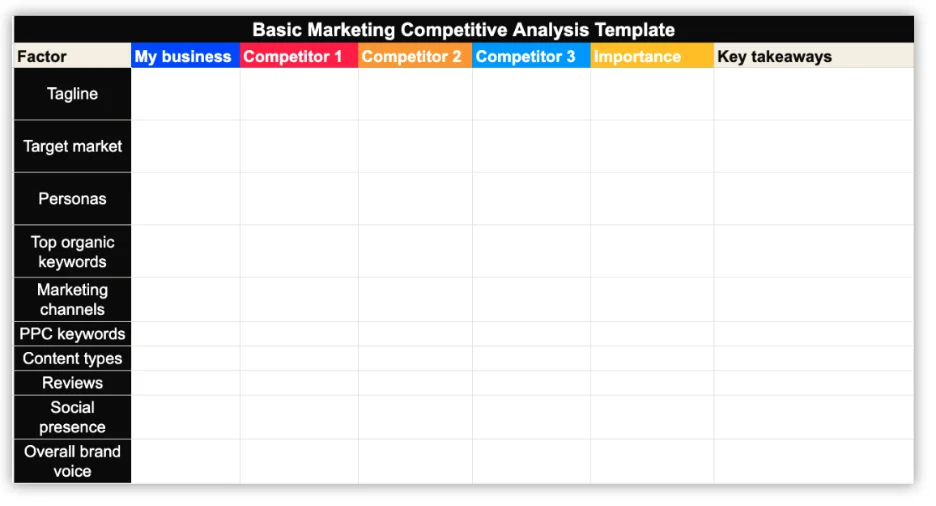There are 33 million small businesses in the US alone, and 5.5 million new businesses are started every year. And yet, the beauty of this ever-growing world is that there’s always room for one more business. So if you aspire to start a business, we support you!
And if you need a little help with ideas and planning, you’re in the right place. In this article, we’re sharing nine ways to brainstorm business ideas to help get you off on the right path.
Contents
- The problem-solving approach
- The personal inventory approach
- The market research approach
- The competitive analysis approach
- The business name approach
- The influencer approach
- The networking approach
- The freelance website approach
- The Gen Z approach
How to brainstorm business ideas: 9 ways
The best part about brainstorming is that there doesn’t have to be a formal process. You can use one of these approaches or a combination of any of them. The goal is to get the juices flowing and see where they take you!
1. The problem-solving approach
This approach is centered around pain points. Put your pain point glasses on for a day and pay attention to every little thing that you find even the slightest bit inconvenient, cumbersome, challenging, boring—basically any negative adjective you can think of. Then brainstorm ways you can solve those problems. The more common the task, the better, because the greater the need.
For some inspiration, check out these creative products you never knew you needed by Lifehack.

An umbrella cupholder? I’d buy one.
💡 Once you’ve identified your business idea, you need a strong value proposition. Learn how to create one in our free guide >> How to Create a Unique Value Proposition From the Ground Up
2. The personal inventory approach
This is the tried-and-true approach to coming up with small business ideas. Take a personal inventory of what comes naturally to you. Consider:
- Your passions: Things you care about
- Your core values: Standards you live by
- Your best skills: What you’ve become good at with practice
- Your talents: What you’re naturally good at without any practice
- Your hobbies: Things you could do all day
List these out and see what kinds of ideas arise from them. I personally recommend this as the top way to brainstorm business ideas, because the more aligned your business is with your core self, the less friction you’ll experience in starting, running, and growing it.

There are several ways to map out your personal inventory, like this one.
3. The market research approach
This is the more practical approach to take when brainstorming business ideas, and one you should incorporate into any of the other approaches. After all, you need to make sure you can actually go to market with your idea and be positioned for long-term success.
Consider industry trends, emerging technologies, and consumer behavior so you can get an idea of the competitive landscape, identify unmet needs, discover niche audiences, and more. Market research encompasses a broad range of strategies, including surveys, social media listening, reading research reports and surveys, using market intelligence tools, and more.

📚 Free guide download >> 135 of the Best Words & Phrases for Marketing with Emotion
4. The competitive analysis approach
Competitive analysis technically falls under market research, but these are so effective that they’re worth calling out as their own approach. In short, a competitive analysis systematically examines the key components of other businesses like yours so you can identify gaps to fill and how to best position yourself. You can look at strengths, opportunities, weaknesses, and threats (SWOT analysis) or use any other criteria that works for you. Here are a few SWOT analysis examples for inspiration.
This approach is great for once you’ve got a clear picture of the type of business you want to start but want more guidance on coming up with the details of that business (like your target audience, buyer personas, value proposition, etc.).

For help with this, use our competitive analysis templates!
5. The business name approach
This, of course, should not be your only approach, but it’s a good strategy to throw in when you need a break from all that market research. Creative business names can give way to creative business ideas, and vice versa.
Do a business naming brainstorm session—use our list of creative business names to start! Just remember, there’s a practical process for naming a business, so be sure to check out our post on how to come up with a business name so you can be prepared.
6. The influencer approach
The right way to come up with a new business idea depends on what’s driving you to start a business in the first place. And if it’s simply that you have an entrepreneurial itch, but no prior experience, then take the time to expose yourself to some entrepreneurial inspo!
Read books written by entrepreneurs, listen to small business podcasts, and start following inspirational business owners on social media. You’ll open yourself up to a wide range of concepts, perspectives, approaches, and mindsets that can give way to great business ideas.

Everett Taylor is one of many inspirational entrepreneurs you can follow on social media.
7. The networking approach
In addition to following popular entrepreneurs on social media, it’s also a good idea to network with “regular” entrepreneurs. The influencers can provide inspiration but talking with people just like you will give you an added level of practicality to your ideation process.
Find networking events and discussions happening in your local community and even virtually. Here are some broader small business networking groups to start with.

SCORE is a great place to find local networking events in your area.
8. The freelance website approach
Who says your new business has to be unique? If you’re looking to start a freelance business, take a look at popular websites like fiverr and Upwork. You can find business ideas that use skills and talents you already have, or ideas that require you to develop new skills to reach growing markets.
For example, take a look at fiverr. The navigation menu and “popular services” section alone can give you a starting point from which to generate ideas.
- Website development
- Logo design
- SEO
- Architecture and interior design
- Social media marketing

fiverr’s homepage alone is filled with business ideas based on demand or skillset.
9. The Generation Z approach
Generation Z is the upcoming generation of consumers, and they are known for being partial to brands that name specific core values and stand for them. If you’ve got a cause you personally care about or specific set of values that you live by, let this serve as the foundation of your business idea.
Examples include sustainability, civil rights, individuality, accessibility, and more. Similar to the personal inventory approach, starting a business out of something you’re personally connected to tends to reduce friction throughout the business’s evolution. Check out our post on Gen Z marketing strategies to see if you have anything in common with them!
Start brainstorming business ideas now
Like I said at the start, even with so many businesses already up and running, the world is always growing and changing. Its many facets—consumer needs, industry trends, personal passions, and more—form a dynamic ecosystem that is always producing opportunities. Use the tips in this post to brainstorm business ideas that align with these opportunities!







